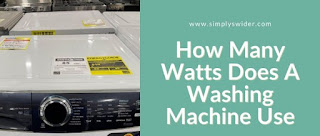If you're trying to figure out how much energy your washing machine uses, you may be wondering how many watts it uses. The truth is that the wattage of a washing machine can vary widely depending on the model and features of the machine. However, there are some general guidelines that can give you an idea of how much energy your washing machine is using.
Most washing machines use between 500 and 2,000 watts of electricity. However, some high-end models can use as much as 3,000 watts. The wattage of a washing machine is determined by a number of factors, including the size of the machine, the type of motor it has, and the features it offers.
One of the biggest factors that affects the energy usage of a washing machine is its size. Larger machines generally use more energy than smaller ones, because they require more power to operate. For example, a compact washing machine with a capacity of 1.5 cubic feet may use as little as 200 watts of electricity, while a larger machine with a capacity of 4.5 cubic feet may use as much as 1,500 watts.
Another factor that affects the energy usage of a washing machine is the type of motor it has. Most washing machines use either a traditional motor or an inverter motor. Traditional motors use a lot of energy to start up and run, which can lead to higher energy bills. Inverter motors, on the other hand, use less energy to start up and run, which can help you save money on your energy bills over time.
Finally, the features of a washing machine can also affect its energy usage. Machines with more features, such as multiple wash cycles, may use more energy than machines with fewer features. Additionally, machines with energy-saving features like cold water wash and load sensing technology can help you save money on your energy bills.
In conclusion, the wattage of a washing machine can vary widely depending on a number of factors, including its size, motor type, and features. If you're concerned about the energy usage of your washing machine, it's important to look for models that are designed to be energy-efficient, such as those with inverter motors and energy-saving features. By choosing a washing machine that uses less energy, you can help reduce your carbon footprint and save money on your energy bills at the same time.

